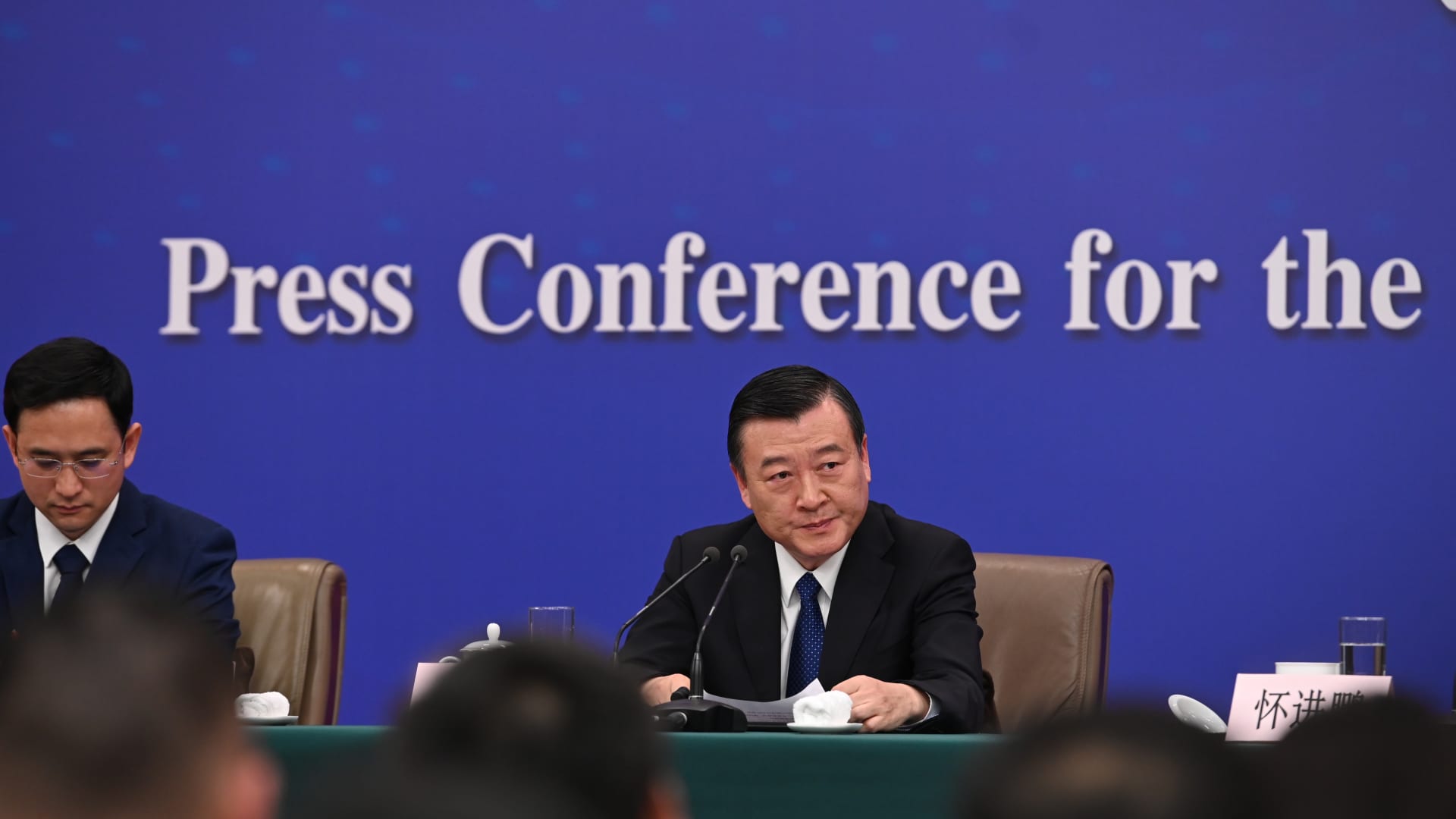China will expand its “whitelist” of real estate projects and speed up bank lending for these unfinished developments to 4 trillion yuan ($561.8 billion) by the end of the year, the country’s housing ministry said Thursday.
Ni Hong, China’s minister of housing and urban-rural development, made the announcement at a press conference, alongside officials from the central bank, finance ministry and the National Financial Regulatory Administration.
A total of 2.23 trillion yuan had already been approved in loans to whitelisted developers. That figure will almost double to 4 trillion yuan by the end of 2024, according to a senior official from the financial regulatory administration.
Launched in January, China’s “whitelist” initiative allows city governments to recommend residential projects to banks for speedier lending. The intent was to ensure the completion of unfinished housing projects so they could finally be delivered to buyers.
All commercial housing projects are now eligible for the “whitelist” project, Xiao Yuanqi, vice minister of the administration said Thursday. The move is expected to broaden the list.
Xiao also stressed that banks should deploy funds “as soon as possible,” saying they could release the loans in full to developers rather than in tranches, according to CNBC’s translation of the Chinese.
The briefing was the latest in a series of high-level government policy announcements aimed at bolstering the economy.
In late September, Pan Gongsheng, the People Bank of China governor announced a 50 basis-point cut to the amount of cash banks need to have on hand, known as the reserve requirement ratio or RRR. He also lowered the minimum down payment for second-home loans nationwide from 25 percent to 15 percent.
Days later, officials in a top-level meeting, chaired by Chinese president Xi Jinping, pledged to “halt the real estate market decline and spur a stable recovery.”
Disappointing briefing?
The officials on Thursday’s briefing appeared to be mostly “fine-tuning existing policies,” Bruce Pang, chief economist and head of research of Greater China at JLL, said. “It will take time for the improvement on sales volumes and prices to be translated into property investment and construction.”
Some investors saw the recent flurry of activity as a sign that Beijing was finally ready to take drastic measures to stimulate growth, and they had hoped for more stimulus measures from the briefing. As Xiao was speaking, Chinese CSI 300 real estate index dropped over 5%, in a sharp turnaround from gains of around 8.7% in the previous three trading sessions.
Volatility in the Chinese stock market is likely to continue as investors “lack conviction that the stimulus package and what’s been announced is going to turn around things,” said Chi Lo, senior economist at BNP Paribas Asset Management.
Over the weekend, officials from China’s Ministry of Finance announced that they would allow local governments to issue more special bonds for land purchases and allow affordable housing subsidies to be used for existing housing inventory, instead of only new construction.
Chinese property stocks soared on Monday off the news, with the Hang Seng Mainland Properties Index rising over 2%. Real estate was also the leading gainer in Mainland China’s CSI 300, advancing by nearly 5%.
From its peak in 2020, the HSMPI has lost more than 80%. In May, Ni told reporters at a press conference that developers “that must go bankrupt, should go bankrupt, or be restructured.”
Real estate slump
More than 50 cities across China have introduced policies to boost the real estate market, according to state media, citing the housing ministry.
Ahead of the Golden Week holiday, the city of Guangzhou announced it will remove all restrictions on home purchases. Meanwhile the governments of Beijing, Shanghai, Shenzhen moved to ease homebuying restrictions by non-local buyers and lowered the minimum down-payment ratios.
The slew of measures came after China’s previous measures had led to little meaningful rebounds. New home prices in August dropped at the fastest pace in more than nine years, according to the National Bureau of Statistics data.
The value of new homes sold fell by 23.6% for the year through August, slightly better than the 24.3% drop year-to-date as of July. Average home prices fell by 6.8% in August from the prior month on a seasonally adjusted basis, according to Goldman Sachs.
The real estate sector — once accounted for more than a quarter of China’s economy — had been in a painful downturn since 2021, when Beijing launched a crackdown on the sector’s high debt levels, sending a slew of developers to default on their debts and leave many housing projects unfinished. That had severely dampened homebuyers confidence in the market.
— CNBC’s Evelyn Cheng contributed to this story.
Read the full article here







